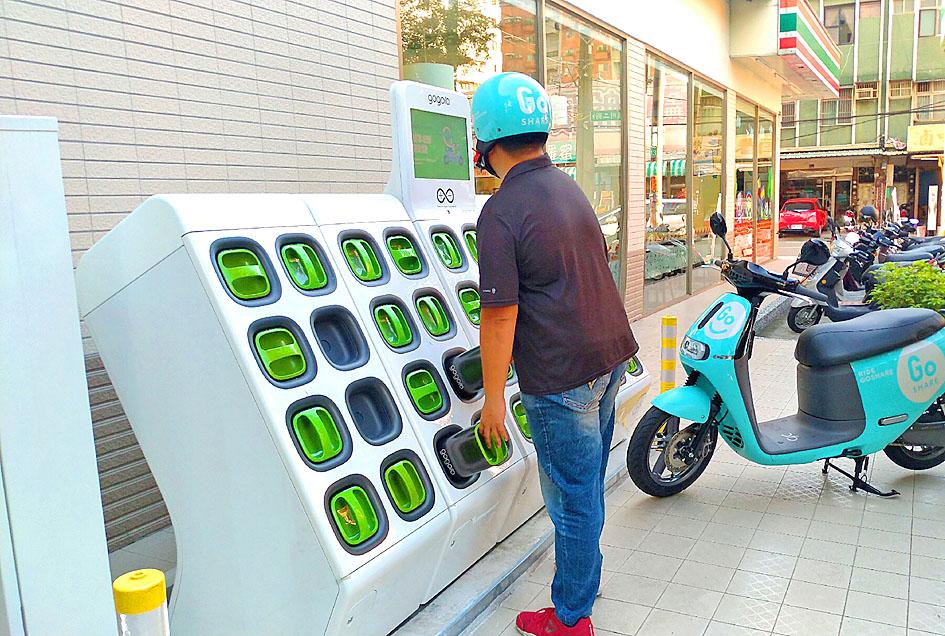Gogoro Inc (睿能創意), a Taiwanese manufacturer of electric scooters that specializes in battery-swapping technology, is in talks to go public through a merger with Poema Global Holdings Corp, a blank-check firm, people with knowledge of the matter said.
The deal is set to value the combined company at US$1 billion or more, the people said, asking not to be identified as the information is private.
An announcement could come as soon as this week, they said.

Photo courtesy of the New Taipei City Department of Transportation via CNA
Terms might change and, as with any deal that is not finalized, it is possible that talks could fall through, they said.
A representative for Gogoro said that “as a matter of policy, we don’t comment on rumor or speculation.”
Poema did not immediately respond to calls or e-mails seeking comment.
Taipei-based Gogoro has touted its ability to reduce energy consumption with its products that power electric scooters and other two-wheeled vehicles.
Last month, it said that together with its customers, it had prevented 300 million kilograms of carbon dioxide from entering the atmosphere.
“Gogoro’s innovative battery-swapping technology will provide cities with a better electric refueling system that greatly reduces consumer anxiety on battery life and range as well as usage costs,” Dong Jinggui (董經貴), chairman of Yadea Group Holdings Ltd (雅迪集團控股), a Gogoro partner that makes e-scooters and bicycles, said in a statement in May. “It will introduce a brand-new mobility experience that is safer and more convenient while reducing the carbon footprint of our customers.”
Led by chief executive officer Horace Luke (陸學森), Gogoro counts Singapore’s Temasek Holdings Pte, Panasonic Corp, Al Gore’s Generation Investment Management LLP, Sumitomo Corp and France’s Engie SA among earlier backers.
Last month, Gogoro said its network of monthly subscribers eclipsed 400,000, and that it has surpassed 200 million battery swaps.
The company in the past few months has also struck strategic partnerships in India and China.
Poema raised US$345 million in a January initial public offering (IPO).
It has previously said it is focused on finding a company in Asia or Europe that has “validated technologies and attractive unit economics.”

WEAKER ACTIVITY: The sharpest deterioration was seen in the electronics and optical components sector, with the production index falling 13.2 points to 44.5 Taiwan’s manufacturing sector last month contracted for a second consecutive month, with the purchasing managers’ index (PMI) slipping to 48, reflecting ongoing caution over trade uncertainties, the Chung-Hua Institution for Economic Research (CIER, 中華經濟研究院) said yesterday. The decline reflects growing caution among companies amid uncertainty surrounding US tariffs, semiconductor duties and automotive import levies, and it is also likely linked to fading front-loading activity, CIER president Lien Hsien-ming (連賢明) said. “Some clients have started shifting orders to Southeast Asian countries where tariff regimes are already clear,” Lien told a news conference. Firms across the supply chain are also lowering stock levels to mitigate

IN THE AIR: While most companies said they were committed to North American operations, some added that production and costs would depend on the outcome of a US trade probe Leading local contract electronics makers Wistron Corp (緯創), Quanta Computer Inc (廣達), Inventec Corp (英業達) and Compal Electronics Inc (仁寶) are to maintain their North American expansion plans, despite Washington’s 20 percent tariff on Taiwanese goods. Wistron said it has long maintained a presence in the US, while distributing production across Taiwan, North America, Southeast Asia and Europe. The company is in talks with customers to align capacity with their site preferences, a company official told the Taipei Times by telephone on Friday. The company is still in talks with clients over who would bear the tariff costs, with the outcome pending further

Six Taiwanese companies, including contract chipmaker Taiwan Semiconductor Manufacturing Co (TSMC, 台積電), made the 2025 Fortune Global 500 list of the world’s largest firms by revenue. In a report published by New York-based Fortune magazine on Tuesday, Hon Hai Precision Industry Co (鴻海精密), also known as Foxconn Technology Group (富士康科技集團), ranked highest among Taiwanese firms, placing 28th with revenue of US$213.69 billion. Up 60 spots from last year, TSMC rose to No. 126 with US$90.16 billion in revenue, followed by Quanta Computer Inc (廣達) at 348th, Pegatron Corp (和碩) at 461st, CPC Corp, Taiwan (台灣中油) at 494th and Wistron Corp (緯創) at

NEGOTIATIONS: Semiconductors play an outsized role in Taiwan’s industrial and economic development and are a major driver of the Taiwan-US trade imbalance With US President Donald Trump threatening to impose tariffs on semiconductors, Taiwan is expected to face a significant challenge, as information and communications technology (ICT) products account for more than 70 percent of its exports to the US, Chung-Hua Institution for Economic Research (CIER, 中華經濟研究院) president Lien Hsien-ming (連賢明) said on Friday. Compared with other countries, semiconductors play a disproportionately large role in Taiwan’s industrial and economic development, Lien said. As the sixth-largest contributor to the US trade deficit, Taiwan recorded a US$73.9 billion trade surplus with the US last year — up from US$47.8 billion in 2023 — driven by strong